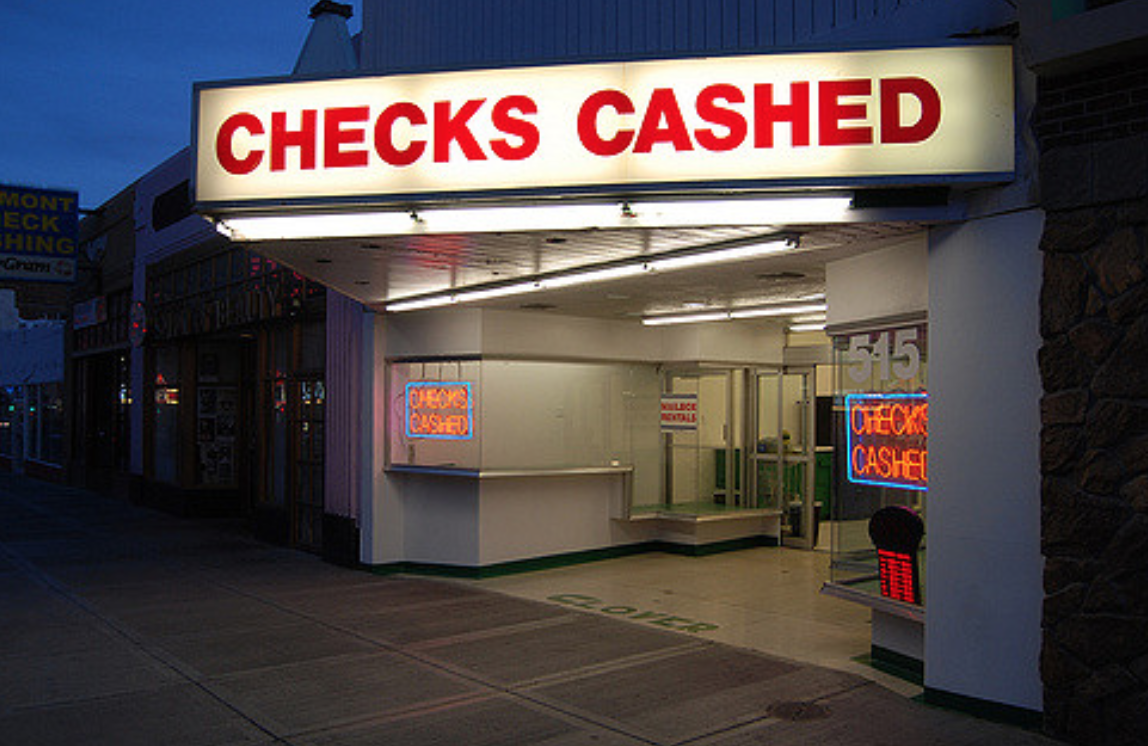Being poor is expensive. Check cashing and payday lenders are two of the ways Americans living paycheck to paycheck are often pushed into costly, vulnerable positions to stay afloat and sometimes simply for the convenience of accessing their money immediately. Combined, check cashing and payday lending represent an $8 billion industry, according to a new report from the Brookings Institution that argues that, with some federal regulation, being poor doesn't have to be quite so expensive.
"The Fed has long had the legal authority to require that checks be processed and cleared faster," writes Aaron Klein, a fellow with the Brookings Institution. "Despite substantial improvements in technology—such as the ability to deposit a check from your phone—lengthy delays in check settlement are still allowed." There is a federal task force underway, Klein notes, but not much else at the moment.
"Real-time payments could save billions of dollars for American families living paycheck to paycheck," wrote Klein, partly by taking away the relative convenience of payday lending and check cashing for people in a pinch.
In the meantime, many cities in Texas have passed zoning ordinances curbing payday lending in a state with otherwise lax regulations of an industry that has been banned in a handful of other states. Without those regulations, payday lenders could charge up to 500 percent interest. Houston is among more than 40 cities across the state that has enacted some sort of business regulation over payday lenders, according to the Texas Municipal League. Passed in 2013, Houston's ordinance limited payday loans to 20 percent of the borrower's gross monthly income and limited the number of times a loan could be refinanced or rolled over, in addition to implementing other regulations.
After similar regulations took effect elsewhere, there seemed to be a drop in payday lending — or at least storefronts — in Houston and across the state, but what it actually meant for consumers, as the Houston Chronicle noted, was unclear.
Even if payday lending was effectively shut down, mused Lisa Servon, author of The Unbanking Of America, How the New Middle Class Survives, at a conference in March at the Houston branch of the Federal Reserve Bank of Dallas, "there's still a problem of too many people living in a state of chronic financial insecurity."
While things like high interest rates certainly further the strains on an often already vulnerable population, payday lenders and check cashers are, in part, responses to a vastly uneven economic landscape. Servon has also argued that there's a spectrum within the industries and that the traditional banking industry has its own share of hurdles, expected and unexpected fees and requirements that can both keep people from acquiring a bank account and punish people who have one but who live paycheck to paycheck.
"Sometimes we think people don’t necessarily know what they're doing," she said of consumers using payday lenders or check cashing services. "Many of them felt like they had no other choice, no other option.”
Roughly 10 percent of households in the Houston metropolitan area did not have a checking or savings account, according to a recent analysis from the Urban Institute, well above the 7 percent national average, though not as high as, say, New Orleans where roughly 17 percent of the population is considered "unbanked."
Unbanked and underbanked households are more likely to use alternative financial services like check cashing and were less likely to have any kind of savings. If they did, it was often held with family and friends.
To attract unbanked customers, some banks offer "second chance" checking accounts or financial literacy courses. "It makes us feel good to offer these classes but we need to know that its actually helping," said Servon in March.
There has been some progress. Nationally the percentage of unbanked households dipped from 8.2 percent in 2011 to 7.0 percent in 2015, a trend the Federal Deposit Insurance Corporation attributed to "improvements in the socioeconomic circumstances of U.S. households."
But that number varied widely depending on socioeconomic status, education and race. Nationally, roughly a quarter of households earning less than $15,000 annually were unbanked in 2015 compared to less than one percent of households earning more than $75,000. Black and Hispanic households were also more likely than Asian and white households to be without a checking or savings account.
Once the most unbanked major metropolitan area in the state, the Houston metropolitan area ranked second behind San Antonio, where 11.3 percent of households did not have access to a bank account, according to the latest analysis from the FDIC. While 10.4 percent of households in the Houston metropolitan area were considered unbanked in 2015, according to the FDIC, an additional 21.2 percent were considered "underbanked," meaning that though they had a checking or savings account they still relied on alternative financial services.
Unbanked or not, just over half of Houstonians — 53.5 percent — had any kind of savings, suggesting a more widespread financial vulnerability.
Improving a slow payment system, as Klein argues, would likely cut down on the costs of "short-term cash crunches." But things like rising income inequality, the sharp decline in black and Hispanic median household wealth and steep housing cost burdens mean that the financial health of a household — and a region — often goes beyond banking.

